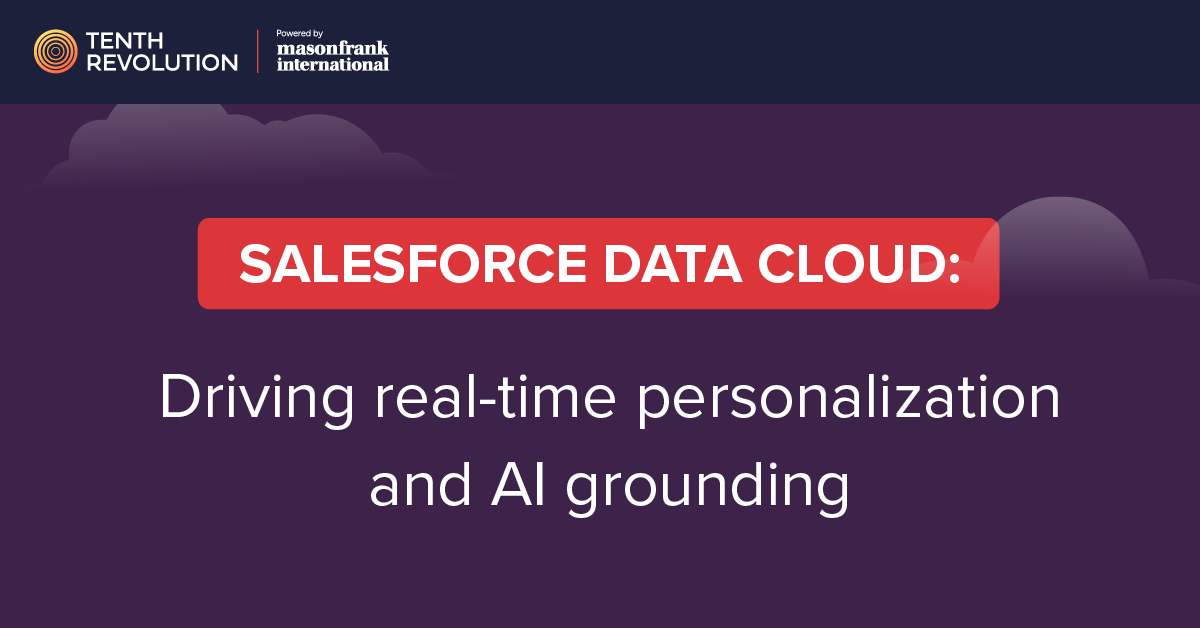
Enterprises today face two competing pressures: customers demand personalized, real-time interactions, while regulators demand data governance, consent, and transparency.
Historically, those goals conflicted. Data was siloed across systems, personalization lagged behind, and AI models lacked a reliable foundation. But that picture is changing. Salesforce Data Cloud is rapidly becoming the default customer data layer—not only for real-time personalization but also for grounding enterprise AI in trusted, consented data.
Why Data Cloud Is Emerging as the Standard
The shift is rooted in the growing complexity of enterprise data. Sales, service, marketing, and commerce each generate unique datasets, often scattered across multiple platforms. Without unification, personalization is limited, and AI becomes little more than a generic guesser. Salesforce Data Cloud addresses this challenge by:
- Unifying data streams into a single, consent-aware customer profile.
- Activating insights in real time across every Salesforce application.
- Grounding AI models —like Einstein Copilot and Agentforce —in governed, reliable, and up-to-date customer context.
The result is a data foundation that balances personalization, compliance, and trust, making it the natural choice for enterprises already invested in the Salesforce ecosystem.
Want to ground your AI copilots in trusted customer data? Mason Frank can connect you with Data Cloud experts to get started.
Real-Time Personalization in Action
Customer expectations have shifted from “personalized” to “predictive and immediate.” Salesforce Data Cloud enables this with practical use cases that are already delivering results:
- Marketing Journeys That Adapt in Real Time: As customers interact with a website or mobile app, Data Cloud updates their profile instantly and adjusts their next email, ad, or push notification.
- Service That Anticipates Needs: Agents see live purchase and support history, allowing them to proactively offer solutions without requiring customers to repeat themselves.
- Commerce Experiences That Convert: Product recommendations and offers update dynamically, driven by Data Cloud’s live connection to behavioral and transactional data.
Each of these examples demonstrates how personalization shifts from being reactive to proactive—an essential competitive advantage in crowded markets.
AI Grounding: Turning Hype into Enterprise Value
Generative AI is only as good as the data it’s grounded in. Without a governed source of truth, AI responses risk being irrelevant, or worse, inaccurate. Data Cloud solves this by providing:
- Trusted context: AI copilots use Data Cloud profiles to ensure every recommendation or generated response is accurate and personalized.
- Consent-first activation: Privacy preferences travel with customer data, ensuring AI outputs always respect compliance requirements.
- Cross-system intelligence: By unifying Salesforce data with external systems (ERP, data warehouses, etc.), AI agents can operate with a 360-degree view of the customer.
This transforms AI from a novelty into a trusted productivity driver that executives can deploy confidently at scale.
Curious about hiring demand for Data Cloud talent? Explore our Salesforce Careers & Hiring Guide for the latest ecosystem insights.
The Strategic Benefits for Business Leaders
Executives adopting Salesforce Data Cloud as their customer data layer are seeing four critical benefits:
- Stronger Customer Trust – Real-time personalization anchored in consent builds loyalty instead of risking regulatory penalties.
- Faster AI ROI – Einstein Copilot and Agentforce deliver better outcomes when grounded in unified, contextual data.
- Operational Efficiency – Teams across sales, service, and marketing tap into the same source of truth, eliminating duplication and confusion.
- Future-Proof Architecture – Zero-copy data integrations with Snowflake and Databricks ensure scalability without increasing storage risk or cost.
This is more than a technology play. Harnessed properly, and it becomes a strategic shift in how enterprises manage customer relationships and deploy AI responsibly.
How Enterprises Can Get Started
For leaders ready to make Salesforce Data Cloud their default customer data layer, a phased approach works best:
- Start with a focused personalization use case (e.g., marketing activation or next-best-service action).
- Integrate external data sources like Snowflake or Databricks to unify your customer profile.
- Enable AI copilots that draw directly from Data Cloud for grounded recommendations.
- Establish a governance framework that embeds consent management and compliance into every workflow.
- Scale across functions, expanding from marketing to sales, service, and commerce as ROI becomes clear.
With these steps, enterprises can move quickly from pilot to production, capturing both short-term wins and long-term competitive advantage.
Salesforce Data Cloud isn’t just another feature. It’s becoming the backbone of customer engagement, powering real-time personalization and ensuring AI is grounded in context, compliance, and trust. For organizations determined to lead in customer experience, it’s fast becoming the default.


